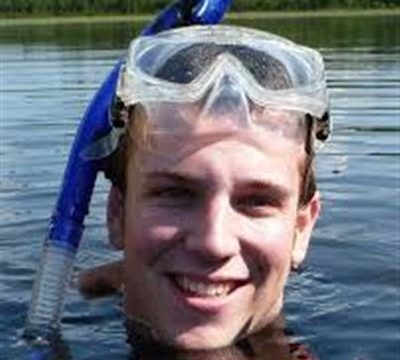Switching from Lakes to Streams: Alex Latzka, New Water Resources Policy Fellow
Although he grew up in Massachusetts, Alex Latzka fell in love with Wisconsin’s lakes and streams when visiting relatives in his youth. That love led him to receive a Ph.D. in freshwater and marine sciences from the University of Wisconsin-Madison’s Center for Limnology.
For his course of study, Latzka worked mainly on lake conservation and management issues such as aquatic invasive species impacts. Later, during his post-doctoral position with McGill University in Quebec, he studied the effects of water-level drawdowns in reservoirs on fish growth rates.
Through all of this, Latzka interacted with government agencies and citizen groups, seeking answers to their questions and concerns. “I tried to be an engaged scientist and ask questions relevant to agencies and policy management, and then work with them to use the answers from research to inform policy and management,” Latzka said.
That experience is what led him to think he could do a good job as Wisconsin’s first full-time postgraduate Water Resources Policy Fellow. “What caught my eye in the description was that the fellow would have an opportunity to interface high-level science with an agency. I liked the idea of having the independence of an academic scientist but working directly with an agency to answer questions that are relevant to decisions they are making right now,” he said.
Apparently, the search committee thought Latzka would do a good job, too. He began his fellowship in Madison last month. Latzka will spend most of his time developing guidance for the amount of sediment (total suspended solids) in Wisconsin streams, as well as regarding the health of the stream’s physical habitat.
“Both suspended solids and poor physical habitat are common reasons streams are designated as impaired in Wisconsin,” Latzka said. “But there’s not a good quantitative basis to use for these designations. I’ll be looking through the data the Wisconsin Department of Natural Resources (WDNR) has to see if there’s some sort of threshold at which total suspended solids start to have a negative effect. And if I find a threshold, I’ll next work to develop guidance for the state for when to assign impairment, and how best to manage streams so that suspended solids can be limited to minimize negative effects.
“This project deals with stream hydrology and water quality more than anything else I’ve worked on before,” Latzka said. “Usually, I work on lakes.”
But for the rest of his fellowship, Latzka will see a little lake action. The other project he’s working on involves developing a model to predict the fluctuation in lake levels across the state, in particular for “seepage lakes,” or lakes fed by groundwater. Seepage lakes are the most common type of lake in Wisconsin, according to the Wisconsin Lakes Partnership.
Outside of work, Latzka enjoys the advantages of Wisconsin’s water resources, also. Trout and musky fishing are some of his favorite pastimes.
Latzka’s fellowship is funded by the UW-Water Resources Institute and the WDNR. His office can be found in the WDNR’s Bureau of Water Quality. He can be reached at Alexander.Latzka@wisconsin.gov.
August 22, 2016
By Marie Zhuikov
Contact Information:
Water Resources Policy FellowEmail: Alexander.Latzka@wisconsin.gov

